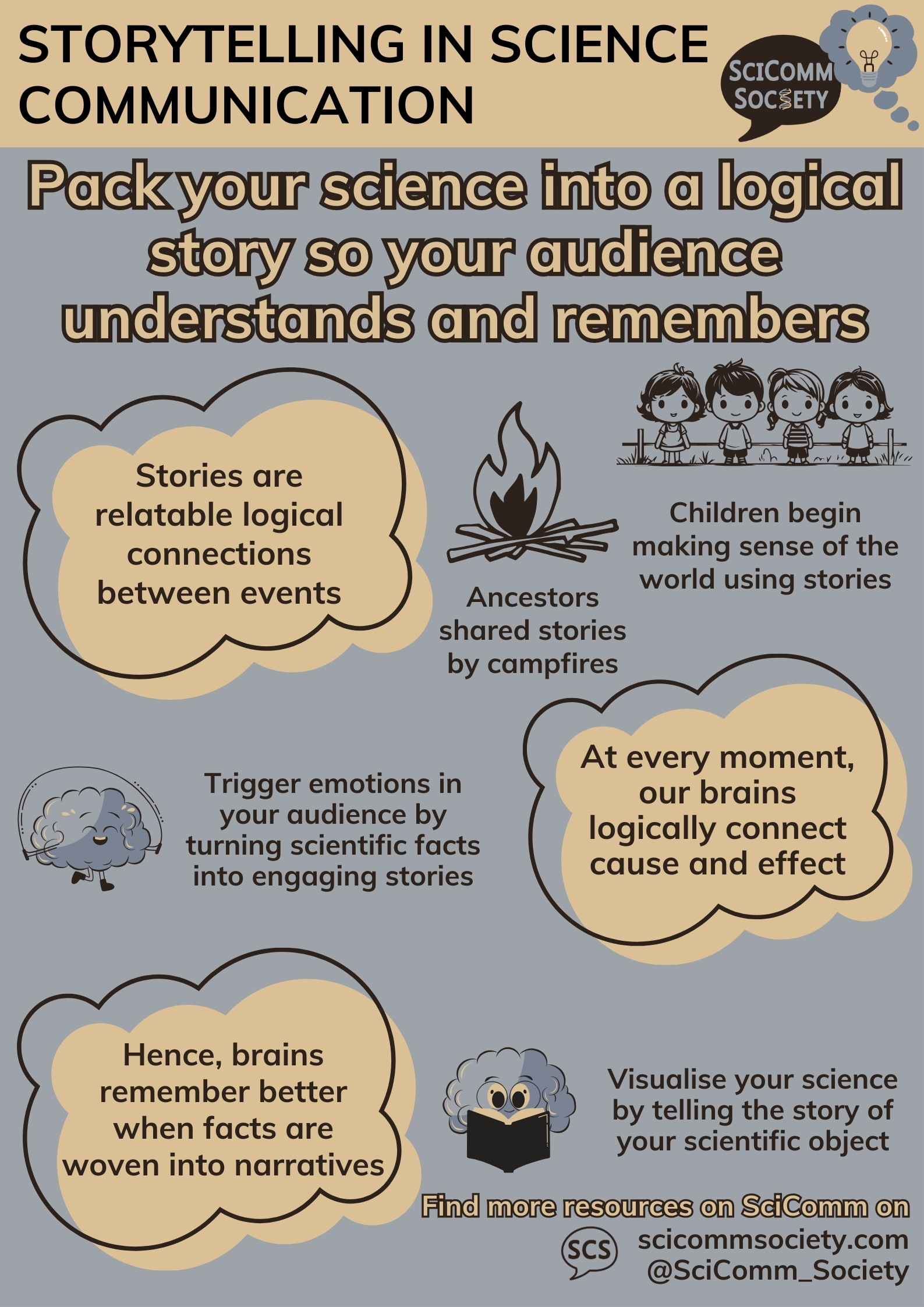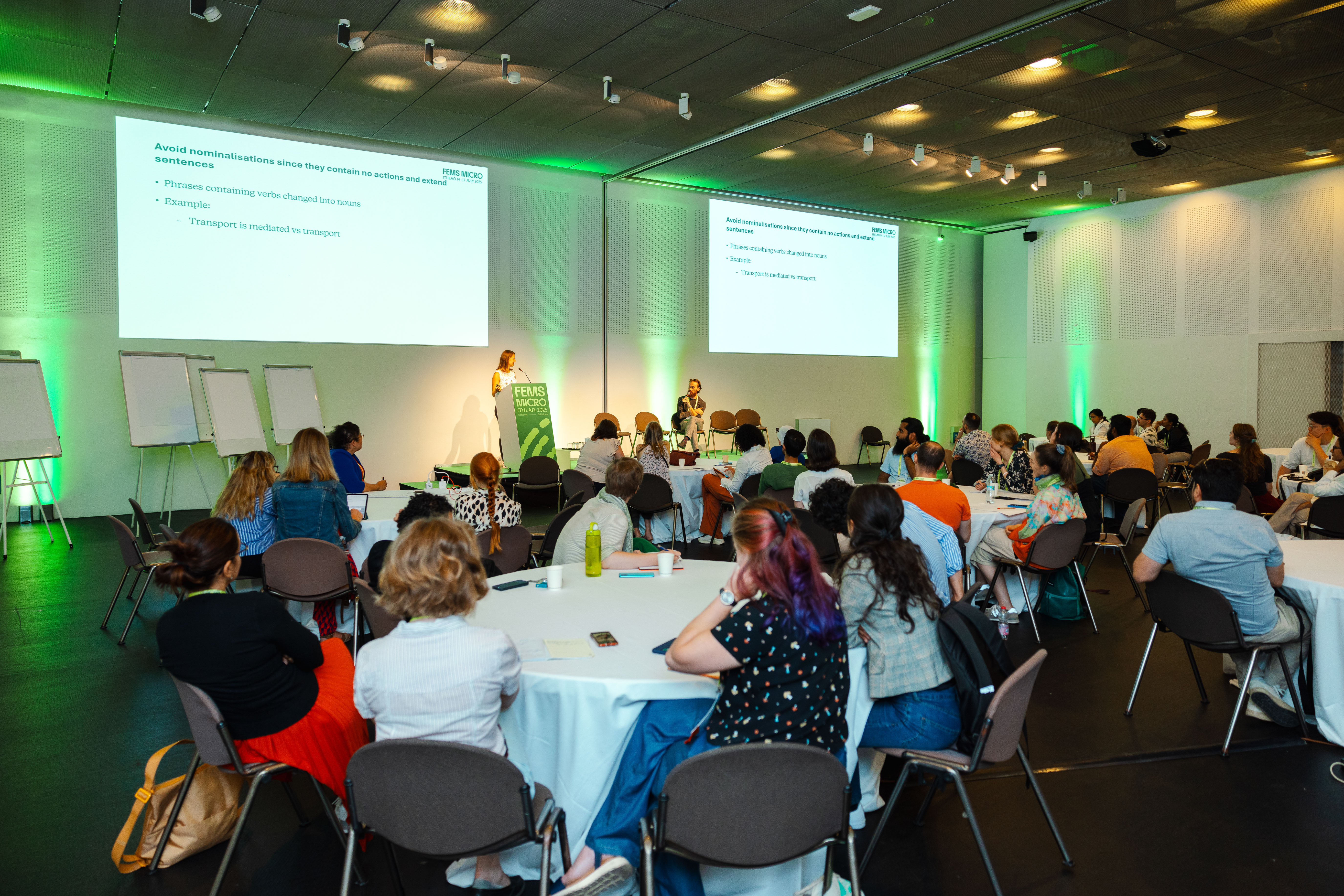Create a science story to share your research with the world
Learn at your own pace how to make your research engaging and accessible.
Every scientist is a storyteller. And even though most know this to be true, they struggle with it.
This self-learning science communication course gives you the necessary tools to create a relatable story about your research. You'll learn how to connect your experimental results logically, helping others understand your science.
Thank you for your purchase
Have a great day!
Why we need to create engaging stories from research
Human brains love logic. At any given moment, your brain tells itself stories about the surroundings to make sense of the world. And because of that, stories are everywhere around us.
Stories were what our ancestors told each other around campfires. They are the first things young children come up with to understand the world. Parents tell their children fairy tales to teach them about the world, history and morals. With stories, we comprehend bigger concepts as we make logical sense of them.
That's why we also understand scientific facts and concepts better when presented as stories. It doesn't matter if you share your experimental findings in a scientific journal, break them down in a social media post or introduce your project at a conference. Even when talking to neighbours, friends or family about your work, a logical and comprehensive story helps your audience connect with your science and get the big picture.
It may seem difficult to take that step back and see your research as a story. But to create an engaging and logical story from your research, we rely on four straightforward pillars: emotions, an interesting hero's journey, active language and logical connections. In this self-learning course, you will learn about these pillars and apply them to your research project to create your own story. You can then share your story directly in a social media post or an outreach talk, flesh it out for a publication abstract or use it as a framework for comprehensive grant applications or conference talks.

What you'll do in this self-learning course
🔹 The science of storytelling: Learn how our brains make sense of big concepts through logical and connected stories
🔹 Emotions in stories: Understand how to harness emotions to help your audience connect with and care about your research
🔹 Creating a storyline: Craft a relatable narrative as you identify the hero of your research and their story
🔹 Connecting the story: Link the pieces together into a logical story that flows
🔹 Telling an action-packed story: Adapt your language so your story moves forward and engages your audience
What you'll get in the course on storytelling
⭐ Your personal course dashboard in Notion with videos and space to create and adapt your story
⭐ 60 minutes video material outlining the steps to craft your science story
⭐ Reflective questions to help you create the storyline
⭐ Educational resources on improving your science communication skills
⭐ Creative ideas on how to reach a global audience and share your story with the world
⭐ Promotion of your science story via SciComm Society's channels
⭐ A personal certificate, unique feedback and support for your story
Ready to tell a story about science?
Hi, I am Sarah, a microbiologist-turned science writer, blogger and communicator. After having left academia, my aim shifted towards helping scientists share their knowledge with the world.
I've noticed that many scientists struggle with telling engaging and logical narratives from their projects even though they have all the necessary information in their heads. That's why I learnt about approaches to transform scientific knowledge into a story and compiled my adaptation into the successful guide on using storytelling in science communication. Based on that, I created an interactive workshop and this self-learning course to apply the storytelling model in more practical settings.
Read my publication "Transforming science into engaging stories" about my experience delivering the storytelling workshop at scientific conferences.
"Thank you so much for all the practical tips on science writing. I learned so much in the workshop!" Participant at the FEMS Micro 2025 in Milano"As researchers, we should know how to write good stories about our projects. So it is great that finally someone tells us how to do it." Participant at the IPNC 2025 in Porto

Photo credit: FEMS at FEMS Micro 2025
As you work through the course at your own pace, you will be developing an engaging story about your research project. This story you can directly share on social media, adopt for your next talk or elaborate into a complex narrative for your next grant application. Whatever the goal of your science communication project, you will have the tools and framework at hand to craft a creative story that evokes emotions and helps your audience understand science.
If at any point throughout the process you are struggling or need advice, you can contact me by email and I'm happy to support you in your project.
At the end of the course, you will receive a certificate to add to your CV and social media profiles as well as a personalised certificate upon request.
Are you ready to share your science with an accessible and engaging story? I'm excited to see what you create!
Thank you for your purchase
Have a great day!
Share Science Stories.
Ignite Curiosity.
Make an Impact.
